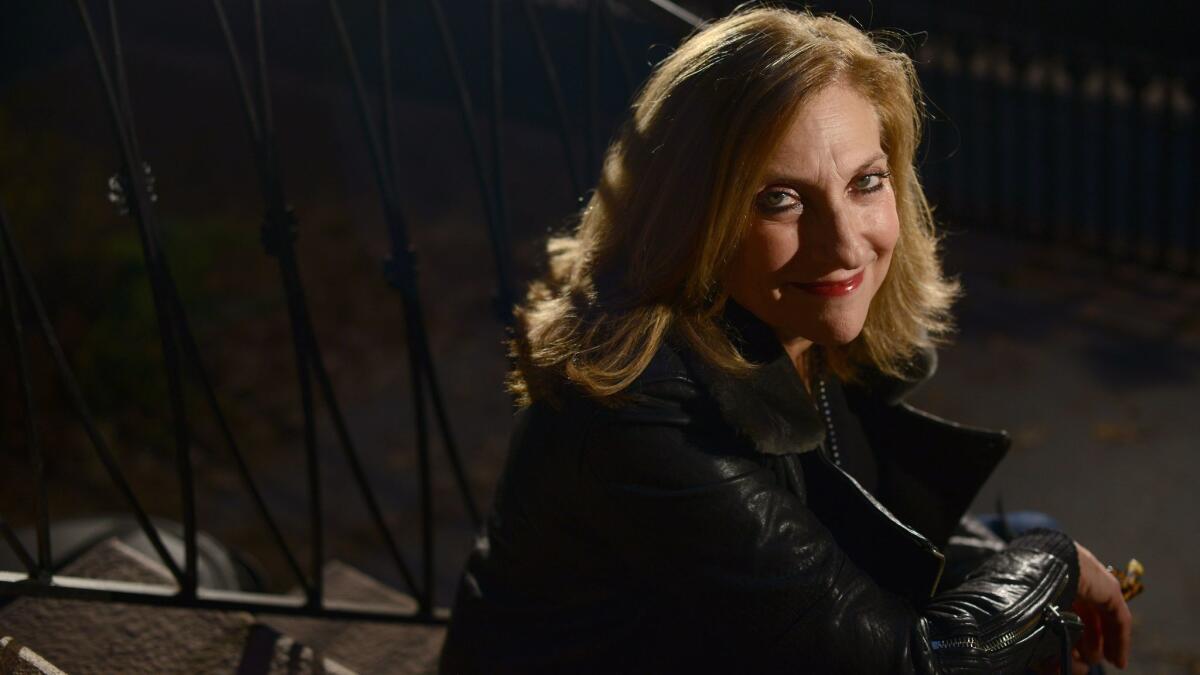Women directors bring unique experiences to the small screen — it’s getting in the door that’s tough

- Share via
It sounds counterintuitive, but when showrunner Jill Soloway was hiring directors for “Transparent,” she deliberately sought out creative collaborators who had little TV experience. Believing that technical mastery wasn’t as crucial as vision or a feel for emotional truth, Soloway offered female and transgender directors what she called “golden tickets,” just like the ones found in Willy Wonka’s chocolate bars — except these were shortcuts to a career in television rather than entrance to a candy paradise.
Despite directing several independent films, Nisha Ganatra had made little headway in television. “It’s like a catch-22: You can’t do it unless you’ve done it before, and nobody will let you do it!,’ she says, laughing. When she heard of Soloway’s plan to dismantle the normal way of making TV, Ganatra told her, “Hey, I’ve got just the résumé for you!” After her “Transparent” break, Ganatra went on to work on “Dear White People,” “Fresh Off the Boat,” “Girls” “The Mindy Project” and “Mr. Robot.”
Soloway is part of a wave of showrunners — among them “Queen Sugar’s” Ava DuVernay, “American Horror Story’s” Ryan Murphy and “Jessica Jones’” Melissa Rosenberg — committed to staffing their series with more female directors. Although “diversity” is a mantra in Hollywood, it is belied by 2016 Directors Guild statistics showing that only 17% of all episodes on broadcast, cable and streaming networks are female-directed, with minority women accounting for a puny 3%.
“If you’d asked me when I started 25 years ago whether we would still be discussing this in 2017, I would have said absolutely not,” declares Lesli Linka Glatter, a veteran director of movies and television who’s been nominated for four Emmys for her work on “Homeland” and “Mad Men.” Now an executive producer on “Homeland,” Glatter began her career in the female-dominated dance world. Moving from choreography to directing, she was startled by the gender disparity, but assumed the problem would fix itself in time as talented women pushed their way through. Recent series such as “The Handmaid’s Tale” and “Harlot” have made a point of hiring all or mostly women directors, but progress over the years has been sluggish.

One enduring problem is that the entertainment industry works through creative relationships that run on trust and rapport. When showrunners hire directors to shoot a TV episode, they need to know their own vision can be replicated on a tight deadline. That tends to make showrunners, consciously or unconsciously, choose people who resemble them and make them feel comfortable. “You can picture the older male director who hires the freshman director,” says Soloway: “They are both wearing baseball caps and he’s got his arm around the kid and they know how to do this because they’ve both been on teams and they know how men mentor one another.”
See the most read stories this hour »
Breaking these patterns means dissolving cozy networks; every female or minority hire is one less job for the boys. “You can’t just make more space,” Soloway argues. “So you are asking men to not hire the people they know and trust, people that make it easy for them because they have a shorthand. That is a pretty big ask for a lot of men who don’t consider themselves racist or sexist but have comfortable systems in place for their professional and personal relationships.”
Aline Brosh McKenna, the co-creator and showrunner of “Crazy Ex-Girlfriend,” suggests that women are also sometimes put off by technical barriers. Where “men tend to blithely go into situations under-prepared and learn on the job,” she worries that women may feel they need to be ultra competent to take a shot at directing. When she directed the season finale of “Crazy,” Brosh realized she didn’t need “precise jargon” to communicate with the experts on set: They were there to translate and realize her ideas. “I’d say, this is what I want it to look like and feel like and here are some other shots that I found that have the vibe I am looking for.” Directing is about “storytelling,” she says, and all that really matters is that as the director “you know the story you want to tell.”
Melina Matsoukas knew she was the right storyteller for HBO’s “Insecure” from the moment she laid eyes on the pilot script. Written by first-time showrunner Issa Rae, “Insecure” mirrored Matsoukas’ own life “as a young black woman having to navigate through worlds where we don’t always fit in and we have to code switch in different environments.” Even with her MFA in cinematography and an impressive résumé of music videos (She directed Beyoncé’s epic, Grammy-winning “Formation”), Matsoukas knew her lack of TV experience could be a hurdle. So she put together a treatment to convince executives she had a distinct vision for the show. The gambit worked, overcoming HBO’s doubts. “We are telling stories about women and people of color on the show,” she says, “so that diversity on screen should lead to more diversity behind the camera as well.”
Ganatra believes strongly that a wider array of directors will subtly change the way television looks and the kinds of tales it tells. As an example, she mentions a recent gig in which the script called for characters to walk past a dead woman’s body in the hallway. She said, “I’m so tired of seeing dead women on screen. Could it just be a dude’s body?” The writers agreed. Says Ganatra, “It’s just little things that you don’t realize. The way you see everything is based on your experience.”
More to Read
From the Oscars to the Emmys.
Get the Envelope newsletter for exclusive awards season coverage, behind-the-scenes stories from the Envelope podcast and columnist Glenn Whipp’s must-read analysis.
You may occasionally receive promotional content from the Los Angeles Times.











